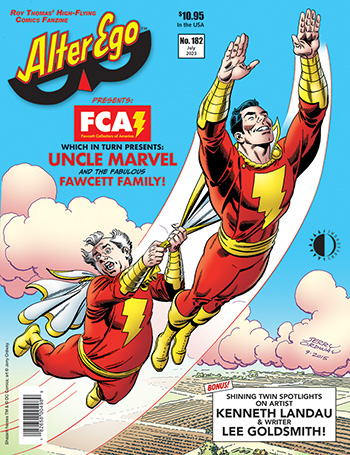Alter Ego #7 Winter 2001 (magazine review).
I had the good fortune of acquiring a paper copy of Alter Ego #7 recently. As my collection grows, it seems increasingly likely that one can assemble a complete series of any genre magazine with enough diligence and a bit of luck. Let’s delve into some highlights from this issue. When it was published, Roy Thomas’s “The All-Star Companion” Volume 1 had just been released. Thomas mentions in his editorial that he included additional details in Alter Ego that didn’t fit into the book, without any initial plans for a second volume. These volumes are so rare that finding them is akin to searching for hen’s teeth.
The issue kicks off with an interview conducted by Thomas with DC Comics editor Julius Schwartz, exploring his early years at the company. Despite the challenges of recalling events from four decades prior, the interview provides valuable insights into the pay scale, the dynamics among editors, and the integration of superheroes from the All-American comics group into National Periodicals. The editorial process, involving significant involvement in story plotting, suggests a tight control over the creative output, making these early issues particularly valuable for research. Interestingly, Schwartz reflects on the designation of Earth numbers in the comics, suggesting they might have been better reversed, but they were based on the status quo of the current Earth.
A standout feature examines all the Justice League/Justice Society crossovers, starting with the seminal “Flash Of Two Worlds” story that connected Earth-One and Earth-Two. This annual tradition, fueled by strong sales, highlights the readers’ appetite for ensemble casts despite the complexity it introduces for writers. These crossovers offer a unique challenge, blending various characters and observing their interactions. My personal encounter with one of these team-ups offered a colorful contrast to the more monochromatic offerings in the UK before the advent of TV21.
Craig Delich investigates the oath used by both Green Lanterns, tracing its evolution. The mystery of who originally crafted the oath remains, given its development over time. An unanswered question lingers: why was the character named Green Lantern when his power-recharging process is not public? This curiosity is perhaps why the Earth-3 villain was named Power Ring. The oath, in essence, reflects the necessity of a 24-hour charge.
The first 1964 New York Comicon is recounted by attendees Ethan Roberts, who discovered the venue, and Bill Schelly, who provides additional details, including the malfunctioning air conditioning. A post-event fanzine listed attendees, many of whom would later become industry professionals.
On the Fawcett comics side, Roger Hill interviews David Raboy, son of artist Mac Raboy, offering insights into his father’s view of art as a lucrative job. A subsequent interview with Rubin Zubofsky, later known as Bob Rogers, who worked with Raboy at Fawcett, portrays Raboy as a perfectionist who worked in short, productive bursts.
An interview with ‘Mad’ artist/writer Dave Berg (1920-2002) by P.C. Hamerlinck covers his early career at Fawcett and work with Will Eisner, who recognized Berg’s writing talent.
These early editions of Alter Ego offer a treasure trove of comic history and insights, a must-read for enthusiasts able to track them down.
GF Willmetts
February 2024
(pub: TwoMorrows Publishing. 98 page illustrated magazine. Price: varies. ISSN: 1932-6890. Direct from them, you can get it digitally for $ 4.99 (US))
check out websites: www.TwoMorrows.com and https://twomorrows.com/index.php?main_page=product_info&cPath=98_55&products_id=500






